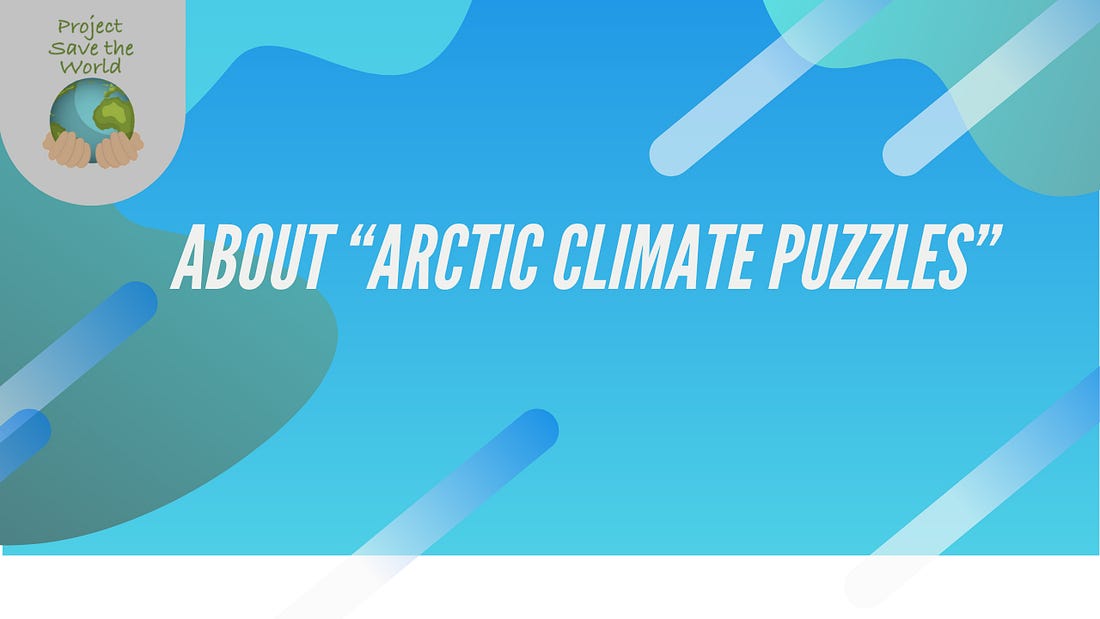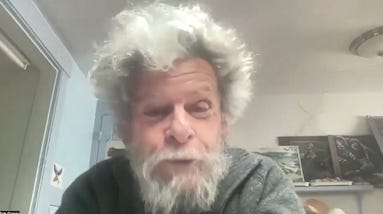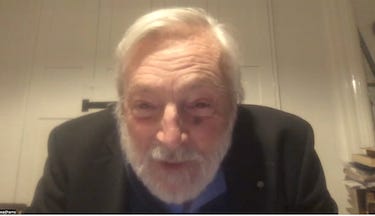 |
New update from Project Save the World
About “Arctic Climate Puzzles”
Why didn’t they tell us that the North Pole was melting? And what caused a big emission of gases and pollutants into the Arctic atmosphere if not a methane explosion (which it was not)?
|
|
In this conversation, we dive into a worrisome topic: the accelerating impacts of climate change, particularly in the Arctic. It’s not just a conversation about melting ice or rising temperatures—it’s about the real-time, drastic changes that are happening right before our eyes, and the urgency to take action. Peter Wadhams and Thomas Goreau bring their expertise, painting a vivid picture of the challenges we’re facing in the Arctic and beyond.
Metta Spencer starts the conversation by introducing her two guests. Peter Wadhams, a professor emeritus of ocean physics at the University of Cambridge, who focuses on Arctic sea ice. He’s been at the forefront of research on how the ice is thinning, especially in the Arctic, which is warming at a rate much faster than the rest of the planet. Then, there’s Thomas Goreau, an expert on coral reefs and ocean circulation. While he focuses on warmer regions, he points out that the Arctic isn’t just a cold, isolated part of the world; it has a massive impact on the rest of the planet, including the coral reefs he monitors in tropical waters
Thomas Goreau
The North Pole Was Melting
Thomas expresses his alarm about February 2, 2025, a day when the North Pole experienced temperatures 30°C above average for that time of year. This is not just a simple anomaly—it’s an unprecedented event that could have massive global consequences. Yet, despite the significance, this news was almost entirely ignored by the mainstream media. It wasn’t until days later that theEuropean Space Agency confirmed the event, raising suspicions that this news may have been suppressed. Why, when something this monumental happens, does it get no coverage? Is it possible that powerful interests don’t want thepublic to know how dire the situation truly is?
While we hear a lot about global warming in the media, the Arctic’s rapid temperature rise is often overlooked. According to Peter, this is not just about the ice melting—it’s about the impact on marine ecosystems and how it affects the entire global climate system. In the past, we might have had a few years of slightly warmer-than-usual temperatures, but now, we’re seeing extreme and sustained warming that is not only unprecedented but also accelerating.
As the discussion continues, Thomas shares his concern about an event in theRussian Arctic that happened in August 2024. He noticed an unusually high level of pollution, particularly carbon monoxide, in an area of the Arctic that’s known for its environmental dangers—like nuclear waste disposal. This event, which lasted for about ten days, was an environmental anomaly. It was as if the region had experienced some sort of explosion, but there was no methane signal, which would have been expected if it had been a methane release. This confusion only adds to the mystery of what’s happening in the Arctic.
Peter Wadhams adds to the discussion by touching on the idea of marine heat waves, which have been increasingly common in the Arctic and Antarctic. These heat waves are not only affecting the ice but also ocean currents, which can have ripple effects on weather patterns around the world. Both experts agree that these disruptions are part of a larger, global pattern—one that’s now so extreme that it can no longer be ignored.
There’s also mention of the so-called “methane time bomb,” a terrifying possibility that’s been discussed among climate scientists for years. The fear is that large amounts of methane, a potent greenhouse gas, are trapped beneath the Arctic ice and could be released explosively as the ice melts. The concerns are valid, especially given the unexplained pollution events and extreme temperatures.
Denial, Denial, Denial
Throughout the conversation, both experts share their frustration at the lack of attention these issues are getting. When Thomas tries to reach out to other scientists about the pollution event, he finds that they’re either unwilling or unable to collaborate. Scientific information should be shared freely, but politics—especially international politics—seem to be getting in the way. Thomas, for instance, mentions how Russian scientists have been essentially “frozen out” of international collaborations due to political tensions. Moreover, researchers in Russia are afraid to collaborate with international scientists, fearing they might face government retaliation for discussing climate issues that don’t align with the official narrative. Thomas’s recent attempt to reach out to a Russian scientist for data on methane emissions met with reluctance.
Metta asks about the implications of this lack of collaboration. As Peter points out, this isn’t just a problem for the Arctic; it’s a global issue. When countries withhold or manipulate environmental data for political reasons, it hinders our ability to respond effectively. The lack of transparency only makes it harder for people to understand the true scale of the problem and take action before it’s too late.
Peter Wadhams
The potential “methane time bomb” could be catastrophic, but scientists’warnings have often been brushed aside or even ignored for political reasons. With the world’s richest nations focused on economic growth and exploiting Arctic resources, Thomas points out that they do not want to hear about the dangers that could impede their goals. This raises the unsettling possibility that governments are keeping quiet about potential threats to avoid derailing their plans.
With the Trump administration slashing budgets and shutting down government agencies, there’s a possibility that the National Ocean and Atmospheric Administration (NOAA) will be closed too, and with it the satellite surveillance system that Thomas had created to monitor coral reefs. If that happens, there will be no way for him to continue his work. But in the past, when government-cutters have tried to close NOAA, they discovered that it is the organization that also monitors weather, and that without its reports the farmers and yachts-owners would be unable to plan their days. Maybe that discovery will save thescientific organization again.
Ice Goes and Land Rises
One particularly poignant moment comes when Thomas reflects on thepersonal connections he has to the Arctic region. His grandfather lived in an Inuit community – the People of the Deer – in the barren lands of the Arctic. He describes how these communities are experiencing the climate change in a surprising way —the land is rising instead of falling. Because of this, rivers are drying up, caribou populations are dwindling. This happens because the miles-deep layers of ice that existed in that area long ago has melted, releasing its weight from the land and allowing the land to rise up over thousands of years. The community members have witnessed these changes firsthand, and yet, they’re left out of the broader conversation about what needs to be done.
Peter expresses surprise that Thomas still is in contact with the People of theDeer, who were the first Inuit community that he came to know early in his own work in the Arctic.
The conversation’s tone moves toward somber reflection. The challenges facing the Arctic and the rest of the planet are immense, but there are people out there—scientists, activists, and individuals—who are dedicated to raising awareness and finding solutions. The experts in this discussion feel a deep sense of responsibility to the world and future generations.


